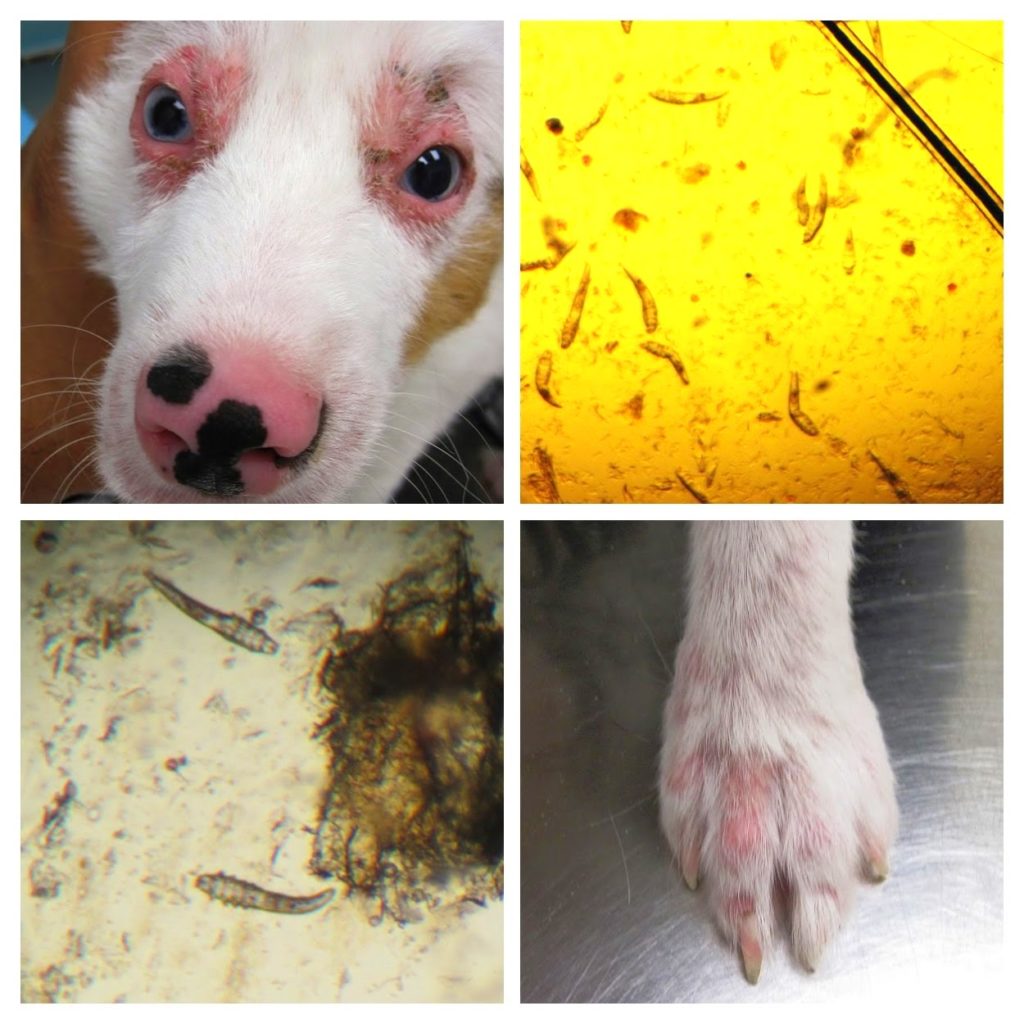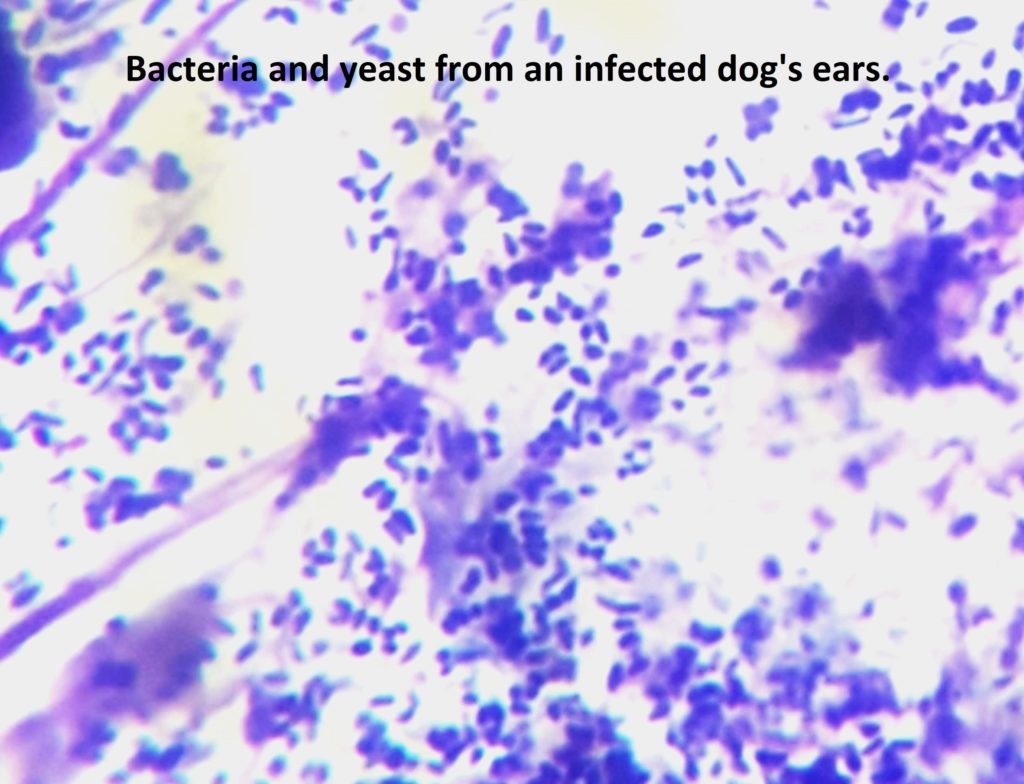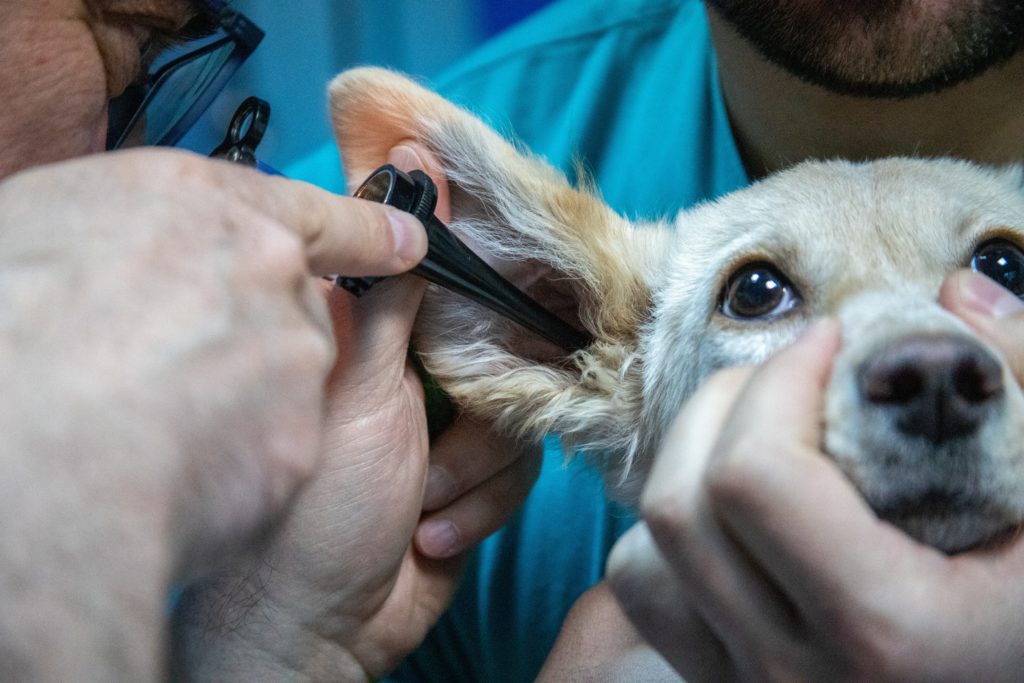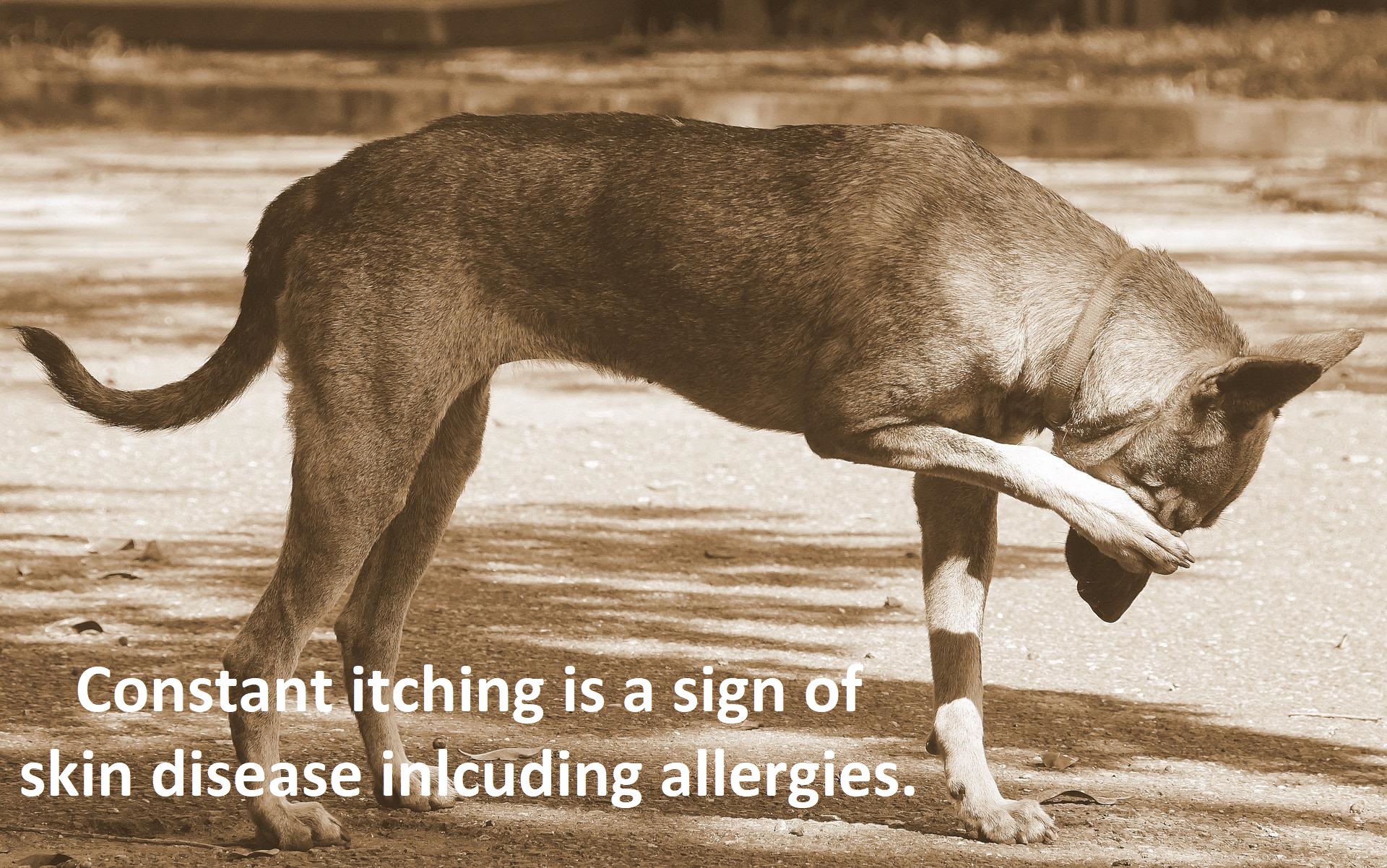Licking paws, scratching, shaking head, hair loss, chewing on fur, bad/yeasty smell, etc. can be sign of underlying skin disease. Some skin diseases are as the following:
1. Allergies are very common in pets and can be both from environment (fleas, pollens, grass, etc.) or from food. There are tests for allergies, as well as several options to treat or manage the allergies. While there is no permanent cure for the allergies but there are many therapies available to manage the allergies to keep your pets comfortable. Treatment options range from steroids, immunotherapy and other medicines eg antihistamines, Apoquel etc. Allergy testing for dogs is available for the environmental allergens. We have special foods available for the pets with food and/or environmental allergies.
2. Mange/Mites can lead to hair loss and itching. Demodex and sarcoptic mange are the two most common mites that affect puppies/kittens. Mange can be diagnosed with skin scrapping and is easily treated.

3. Metabolic and Endocrine diseases like thyroid, diabetes, Cushing’s, etc. can affect the skin. Blood tests are needed to properly diagnose and treat these skin diseases. We recommend yearly blood work for the pets to detect any early sign of the disease.
4. Infection from yeast or bacteria can also affect skin. Normally, skin has a good defense against infections. However, underlying allergies or mange/mites can make skin more susceptible to infections. Ringworm is a fungal infection that is very contagious and zoonotic (transmissible from pets to people). At Harmony Pet Clinic we can test skin for different infections and treat your pet accordingly.
5. Neoplasia or certain skin tumors can also cause pet’s to lick the skin excessively. A through exam helps to rule out any underlying skin cancer.
6. Chronic Pain: Some pets may respond to the mild chronic pain by licking on the spots. Consistent pain may not show other signs like limping or yelping but just licking on the area to smoother it.
We all want our furry friends to be healthy, happy, and comfortable. One of the ways to achieve this is by taking good care of their skin. Pet skin care is not only about keeping your pet looking good, but also about preventing skin infections, allergies, and other skin problems.
Here are some tips on how to take care of your pet’s skin:
- Keep your pet clean and well-groomed: Regular bathing and grooming is essential for maintaining healthy skin. Brushing your pet regularly helps to remove dead skin cells, prevent matting, and distribute skin oils evenly. It also stimulates blood flow, which helps to keep skin healthy and shiny. When bathing your pet, make sure to use a gentle pet shampoo and avoid getting soap or water in their ears.
- Feed a balanced diet: A balanced diet is essential for maintaining healthy skin. Foods that are high in fatty acids, vitamins, and minerals are particularly important. If your pet has specific skin problems, talk to our veterinarian about a dietary supplement that may help.
- Avoid fleas and ticks: Fleas and ticks can cause skin irritation and infections. To prevent fleas and ticks, use a monthly flea and tick preventative. If your pet already has fleas or ticks, consult our veterinarian for a safe and effective treatment.
- Protect your pet from the sun: Just like us, pets can get sunburned. This can cause skin irritation and increase the risk of skin cancer. If your pet will be spending time in the sun, consider using a pet-safe sunblock or providing shade.
- Watch for signs of skin problems: It is important to keep an eye out for any signs of skin problems, such as itching, redness, or bald spots. If you notice any of these signs, consult your veterinarian as soon as possible. Early treatment is key to resolving skin problems quickly and effectively.
Taking good care of your pet’s skin is essential for maintaining their overall health and wellbeing. By following these tips, you can help keep your furry friend comfortable and looking their best. If you have any concerns about your pet’s skin, consult our veterinarian, Dr Raj Banga, for personalized advice and treatment.
Ear infections:
Ear infections mostly occur because of yeast, bacteria (cocci or rods), or ear mites caused by skin diseases. An ear cytology is a quick test to check what is causing ear infection to your pet. For this test a cotton swab is rubbed in ears and then stained and looked under microscope for the cause of infection. Some bacteria can be resistant to many antibiotics and a culture and sensitivity test may be needed to find out the effective antibiotics.

Ear mites are more common in kittens and puppies and are contagious from one pet to the other in close contact. Ear mites cause irritation in ears leading to scratching ears and shaking head. Ears may have dry debris. Ear mites are easy to diagnose by looking the ear debris under the microscope.
Yeast is one of most common reason for ear infections. Any water leftover in the ears after bath/swimming can lead to yeast and bacteria. However, the underlying reason for ear infections is mostly skin allergies as it is the skin that continues into the ear canal.
Ear infections are a common problem in pets, especially those with floppy ears like dogs and cats. Here are some tips on how to prevent ear infections in your pet:
- Keep their ears clean: Dirt and wax buildup can contribute to ear infections. Clean your pet’s ears regularly with a gentle cleanser recommended by your veterinarian. Do not insert anything into the ear canal as this can damage the delicate skin and increase the risk of infection.
- Avoid water in the ears: After bathing or swimming, make sure to thoroughly dry your pet’s ears to prevent moisture from getting trapped inside. This can create a breeding ground for bacteria and yeast, leading to an infection.
- Avoid excessive ear scratching: Excessive scratching can irritate the skin in the ear and increase the risk of infection. If you notice your pet scratching their ears frequently, consult your veterinarian for a diagnosis and treatment.
- Watch for signs of ear infections: Early detection is key to preventing ear infections. Watch for signs such as excessive scratching, redness, swelling, discharge, and odor. If you notice any of these signs, consult your veterinarian as soon as possible.
- Keep your pet’s ears: dry Long-haired dogs may benefit from regular trimming to keep hair out of their ears. This can help prevent moisture from getting trapped inside and reduce the risk of infection.
At Harmony Pet Clinic we diagnose and treat ear and skin problems with an individually tailored plan for your pet. Mostly, ear infection treatment is combined with skin allergies medicines.

August is Itchy Pet Awareness Month. If your pet has itchy skin, different odor to the skin, hair loss or any other abnormality get your pet checked immediately. At Harmony Pet Clinic we offer in depth consultation and individually tailored treatment plan for your pet. Call us to make an appointment for your pet’s comprehensive check up.
